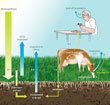 As an example of contradictory thinking it would be hard to better Energy and Resources Minister Gerry Brownlee this week. He was announcing that oil and gas exploration in New Zealand is to get a substantial boost in government resources, including funding to further the possible exploitation of deep-sea methane hydrates.
As an example of contradictory thinking it would be hard to better Energy and Resources Minister Gerry Brownlee this week. He was announcing that oil and gas exploration in New Zealand is to get a substantial boost in government resources, including funding to further the possible exploitation of deep-sea methane hydrates.
He made a plea for New Zealanders to consider the potential for an accelerated oil and gas discovery programme to be achieved in an environmentally responsible way.
“People need to shift their thinking on exactly this issue. The development of New Zealand’s natural resources and the protection of the environment are not mutually exclusive. It is only through a strong economy that New Zealand can afford the expenditure required to look after and improve our environment.”
Is it unfair to construe this as follows?
We need to mine more oil and gas, the burning of which will hasten dangerous climate change, in order to become rich enough to deal with dangerous climate change.
In fact of course, when Brownlee talks of the environment he is probably not thinking of climate change at all. He gives very little evidence of ever thinking of climate change.
The contradictions of which Brownlee is an example are deeply embedded in the political scene in a great many countries. There is very little indication that governments are preparing to stop the mining of fossil fuels. Indeed there’s every indication that they’re ready to increase it whenever it looks as if there could be an economic benefit in doing so. Even the monstrous environmental assault of the extraction of oil from the Canadian tar sands is justified by its proponents. American Senator Lindsey Graham, who once supported a US climate bill, announced recently on a visit to view operations that he was going to do all he could to make sure that the oil sands production was not impeded because of US policy. He remarked that its production “really blends in with the natural habitat”!
One risks being regarded as slightly mad in declaring that a rational New Zealand would leave any possible new oil and gas fields undisturbed, along with coal unless effective carbon capture and sequestration processes are in place. But that seems to me to be the sane view at this stage of our understanding of what greenhouse gas emissions are doing to the climate.
George Monbiot has been reflecting on gap between the grand announcements of governments about emissions reductions and the reality that they aren’t achieving them. In a bleak column this week he writes that the failure of the international political process to find a successor to Kyoto means that “there is not a single effective instrument for containing man-made global warming anywhere on earth.”
It’s not as if the warnings are getting weaker. They are clearly mounting as the evidence continues to accumulate. But “the stronger the warnings, the less capable of action we become.” We were mistaken to think that something might come out of the last 18 years of talk and bluster. Environmentalists tend to blame themselves, but there was no strategy sure of success. The powers ranged against us are too strong.
“Greens are a puny force by comparison to industrial lobby groups, the cowardice of governments and the natural human tendency to deny what we don’t want to see. To compensate for our weakness, we indulged a fantasy of benign paternalistic power – acting, though the political mechanisms were inscrutable, in the wider interests of humankind. We allowed ourselves to believe that, with a little prompting and protest, somewhere, in a distant institutional sphere, compromised but decent people would take care of us. They won’t. They weren’t ever going to do so.”
Monbiot concludes that we must stop dreaming about an institutional response that will never materialise and start facing a political reality we’ve sought to avoid. I guess here in New Zealand that means accepting that the juggernaut of “resource” exploitation is going to roll on and leading politicians are going to continue to talk as if they’re protecting the environment while they’re in the process of destroying it. It also means that only strong organised implacable challenge is likely to have any effect – there is a small ray of hope in the success of mobilised public opinion against mining in protected conservation areas, but whether that kind of mobilisation can be raised against fossil fuels remains to be seen.
It may be worth noting that another columnist this week found reason to sound more upbeat, though certainly not about his own country. Thomas Friedman, writing in the New York Times, lamented the failure of the US senate to pass the energy-climate bill but pointed to the seriousness with which Chinese Communists were by contrast tackling the climate change issue and turning it into an opportunity for the development of clean technologies. Friedman is inclined to optimism, as was apparent in his book Hot, Flat and Crowded, but he provides some basis for it in the case of China.
He quotes Peggy Liu, chairwoman of the Joint U.S.-China Collaboration on Clean Energy, a nonprofit group working to accelerate the greening of China.
“China’s leaders are mostly engineers and scientists, so they don’t waste time questioning scientific data…China is changing from the factory of the world to the clean-tech laboratory of the world. It has the unique ability to pit low-cost capital with large-scale experiments to find models that work.”
Friedman points to the way China has designated and invested in pilot cities for electric vehicles, smart grids, LED lighting, rural biomass and low-carbon communities.
It’s perhaps not much to pin hopes on, especially as coal continues to be used for much new power generation in China. But it may well yet be the case that burgeoning clean technologies will take us further than politicians can. In my inbox this morning was information from the Earth Policy Institute on the continuing rapid growth of solar photovoltaic cell production, described as the world’s fastest-growing power technology. China, Japan and Taiwan are the leading manufacturers. The writer acknowledges that it remains more expensive than fossil fuel-generated power, but points out that its costs are declining rapidly. If fossil fuels ceased to receive subsidies and were required to incorporate their currently externalised costs their relative cheapness would be exposed as only apparent.
Which is good reason to argue in New Zealand for more even-handed government investment in renewables by comparison with fossil fuel extraction. The absurdity of offering so much support for fossil fuels and so little for the green technologies on which our future, if we have one, will depend might be realised by some in our government if we keep on insisting. But it remains a hard slog.
[Cream]


 I opened the farming page of the Waikato Times yesterday evening to see a prediction from Lincoln University agribusiness professor
I opened the farming page of the Waikato Times yesterday evening to see a prediction from Lincoln University agribusiness professor  Last night’s session with the
Last night’s session with the  The latest estimate of
The latest estimate of